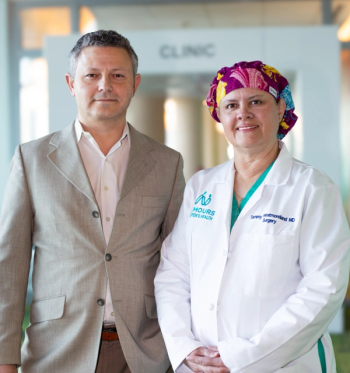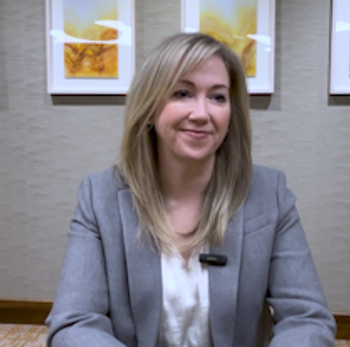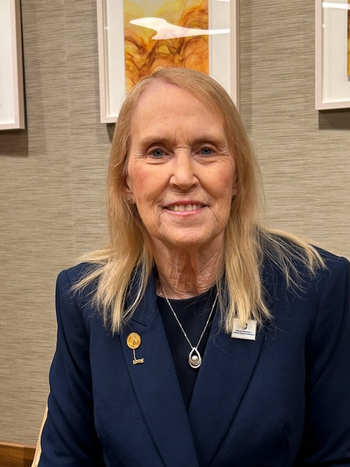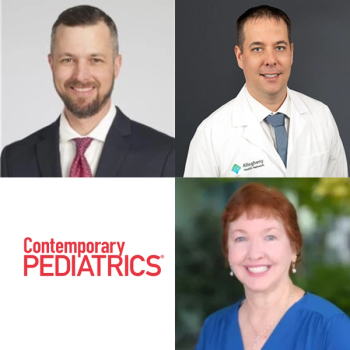
Our editor-in-chief Tina Tan, MD, reacts to a new FDA COVID-19 framework that will limit eligibility for seasonal vaccination in pediatrics.

Our editor-in-chief Tina Tan, MD, reacts to a new FDA COVID-19 framework that will limit eligibility for seasonal vaccination in pediatrics.

Colleen Sloan, PA-C, RDN, highlights what she is seeing in practice related to screen time, devices, and social media and impacts on nutrition.

Music therapist Jenna Marcovitz discusses the role of pediatricians in making timely referrals to music therapy to support whole-child health.

In this video interview, Jenna Marcovitz, MA, MT-BC, CCLS, RMT, provides insight to music therapy and how it can benefit a wide range of pediatric patients.

Peter S. Jensen, MD, discusses the risks and benefits of social media use by children, emphasizing the need for parental oversight and national guidelines.

In this interview, Suzanne Hollander, MS, RD, LDN, discusses the importance of collaborative care in PKU and the impact of a new potential treatment.

A review of the clinical potential of PTC Therapeutics' sepiapterin as a novel treatment for phenylketonuria (PKU).

Joshua Feder, MD, highlights the need for psychiatry to better integrate sensory processing research into care strategies beyond autism.

Watch some of our top clips from a number of discussions with experts who presented at PAS 2025.

Mona Shahriari, MD, discusses how RAD 2025 can equip providers with tools to improve atopic dermatitis outcomes.

A PAS 2025 study by Mazar and Westmoreland shows Zika virus can eliminate both local and distant tumors in neuroblastoma mouse models.

New research led by Geetika Kennady, MD, FAAP, showed that 10.6% of newborns have iron deficiency, supporting a push for earlier screening.

"We've updated our internal clinical pathways to recommend 5 days for kids hospitalized with uncomplicated pneumonia," Cotter noted.

At PAS 2025, Jesse Hinckley, MD, PhD, presented data showing cannabis use sharply increases odds of depression and suicidal behavior in youth.

Jennifer Nestor, MD, evaluated a digital stethoscope to validate pediatric breath sound recordings for potential machine learning algorithm development.

Shorter antibiotic courses for AOM and CAP in children proved effective across a pediatric health system, according to data presented by Elysha Pifko, MD.

Joshua Feder, MD, emphasizes that sensory play is most effective when rooted in relational strategies that support autistic children in daily environments.

Recent research detailed that a child was most likely to be killed in a mass shooting by a parent or family member vs a stranger or peer. Study investigator Stephanie Chao, MD, breaks down these data.

Ambulatory blood pressure monitoring at point-of-care shows high feasibility for pediatric hypertension diagnosis in clinical practice.

Jay T. Rubinstein, MD, PhD, emphasized that children with hearing loss should receive genetic testing, as the investigational DB-OTO gene therapy demonstrated positive results.

Walker and Harris emphasize the importance of early hearing loss detection, screening, and intervention to support optimal child development.

Danielle Van Damme, DNP, CPNP-AC, discussed key updates from the 2024 IDSA guideline on diagnosing complicated intra-abdominal infections, emphasizing ultrasound as the preferred imaging modality.

Karen Y. Capusan, DNP, CPNP-PC, explored RSV’s shifting epidemiology, seasonal trends, and new vaccines’ role in reducing hospitalizations at the 2025 NAPNAP National Conference.

At the 2025 NAPNAP Conference in Chicago, Jessica Spruit, DNP, CPNP-AC, FAANP, discussed the AAP's first clinical practice guideline on opioid prescribing.

Bobbie Monaco, MSN, CPNP-PC, provided a recap of her NAPNAP session regarding period poverty, and called for continued advocacy and awareness in the United States and globally.

Donna Hallas, PhD, PPCNP-BC, CPNP, PMHS, FAANP, FAAN, comments on the ongoing measles outbreaks and encourages advocation for vaccines and accurate information.

Mary Koslap-Petraco, DNP, PPCNP-BC, CPNP, FAANP, highlighted key updates on influenza, COVID-19, and RSV vaccines at the 2025 NAPNAP National Conference.

Tina Tan, MD, FIDSA, FPIDS, FAAP, comments on the FDA's recent selection of the 2025-2026 influenza vaccine compositions, without the CDC's ACIP meeting and FDA's VRBPAC meeting.

In the final part of this 5-part series, panelists discuss new allergy treatments such as Xolair, early immunotherapy, and their broader impact.

In part 4 of this 5-part series, panelists discuss gaps in pediatric food allergy care, stressing better diagnosis, education, and management.